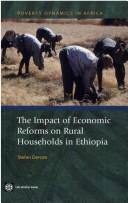
The impact of economic reforms on rural households in Ethiopia
By Stefan Dercon
Subjects: Poverty, Ethiopia, economic conditions, Rural Housing, Economic conditions, Housing, rural, Housing, africa, Housing, Statistics
Description: "This study examines the poverty and growth experience of six villages in rural Ethiopia from 1989 to 1995. The time period was one of relative peace politically, which promoted considerable change in economic policies pertaining to the rural sector. As a result, local growth outperformed the average growth rate in gross domestic product. The focus of the study is the link between economic reforms, growth, and changes in poverty. The author poses the question: Can the observed reduction in poverty be explained by reform-induced higher returns to physical and human capital or simply by better weather? To find the answer, a profit function framework is employed to explain growth using prices and endowments of land, labor, human capital, and location characteristics, with controls for shocks (for example, ill health and drought). The analysis finds that, on average, the poor have benefited more from the reforms than have the nonpoor. But the experience of the poor is mixed, with some outperforming all other households and others persisting in poverty. Although economic reforms do not deliver similar benefits to all the poor, there are high costs for withholding reforms. The study also highlights the effects of shocks on households and the need for social protection measures in a poverty reduction strategy."--BOOK JACKET.
Comments
You must log in to leave comments.